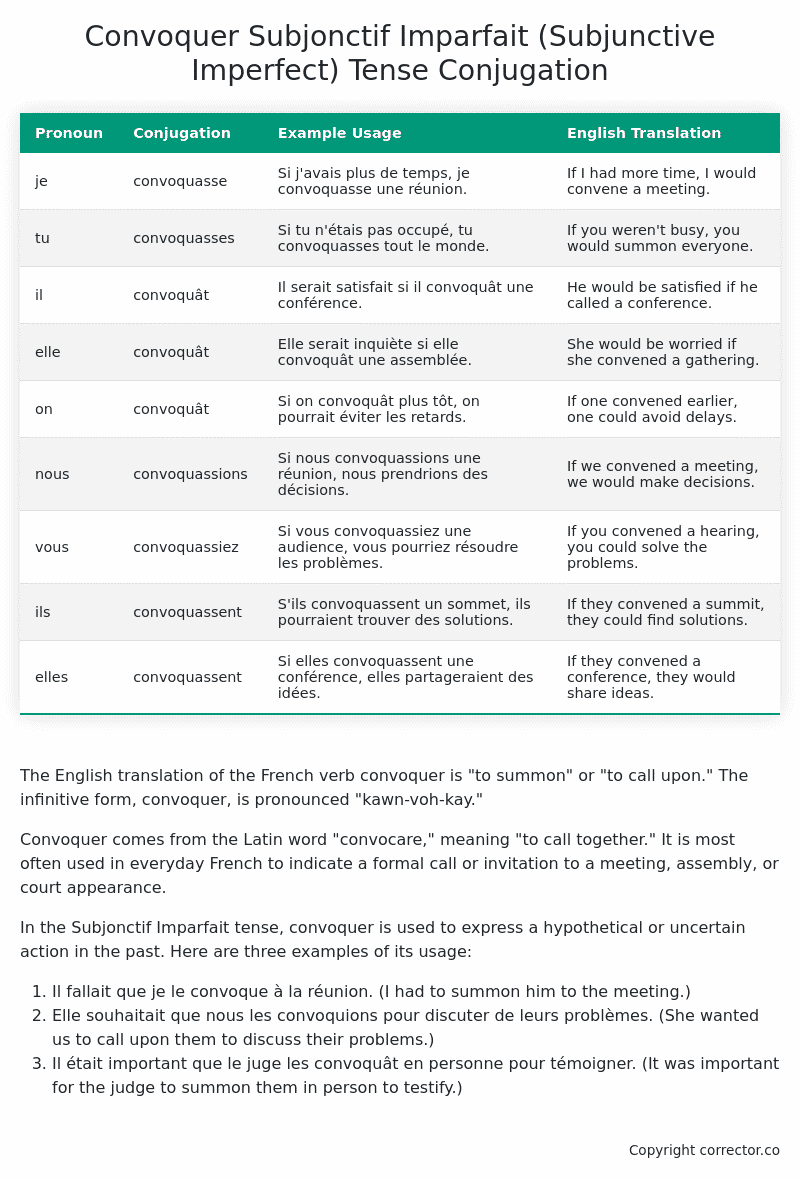Subjonctif Imparfait (Subjunctive Imperfect) Tense Conjugation of the French Verb convoquer
Introduction to the verb convoquer
The English translation of the French verb convoquer is “to summon” or “to call upon.” The infinitive form, convoquer, is pronounced “kawn-voh-kay.”
Convoquer comes from the Latin word “convocare,” meaning “to call together.” It is most often used in everyday French to indicate a formal call or invitation to a meeting, assembly, or court appearance.
In the Subjonctif Imparfait tense, convoquer is used to express a hypothetical or uncertain action in the past. Here are three examples of its usage:
- Il fallait que je le convoque à la réunion. (I had to summon him to the meeting.)
- Elle souhaitait que nous les convoquions pour discuter de leurs problèmes. (She wanted us to call upon them to discuss their problems.)
- Il était important que le juge les convoquât en personne pour témoigner. (It was important for the judge to summon them in person to testify.)
Table of the Subjonctif Imparfait (Subjunctive Imperfect) Tense Conjugation of convoquer
| Pronoun | Conjugation | Example Usage | English Translation |
|---|---|---|---|
| je | convoquasse | Si j’avais plus de temps, je convoquasse une réunion. | If I had more time, I would convene a meeting. |
| tu | convoquasses | Si tu n’étais pas occupé, tu convoquasses tout le monde. | If you weren’t busy, you would summon everyone. |
| il | convoquât | Il serait satisfait si il convoquât une conférence. | He would be satisfied if he called a conference. |
| elle | convoquât | Elle serait inquiète si elle convoquât une assemblée. | She would be worried if she convened a gathering. |
| on | convoquât | Si on convoquât plus tôt, on pourrait éviter les retards. | If one convened earlier, one could avoid delays. |
| nous | convoquassions | Si nous convoquassions une réunion, nous prendrions des décisions. | If we convened a meeting, we would make decisions. |
| vous | convoquassiez | Si vous convoquassiez une audience, vous pourriez résoudre les problèmes. | If you convened a hearing, you could solve the problems. |
| ils | convoquassent | S’ils convoquassent un sommet, ils pourraient trouver des solutions. | If they convened a summit, they could find solutions. |
| elles | convoquassent | Si elles convoquassent une conférence, elles partageraient des idées. | If they convened a conference, they would share ideas. |
Other Conjugations for Convoquer.
Le Present (Present Tense) Conjugation of the French Verb convoquer
Imparfait (Imperfect) Tense Conjugation of the French Verb convoquer
Passé Simple (Simple Past) Tense Conjugation of the French Verb convoquer
Passé Composé (Present Perfect) Tense Conjugation of the French Verb convoquer
Futur Simple (Simple Future) Tense Conjugation of the French Verb convoquer
Futur Proche (Near Future) Tense Conjugation of the French Verb convoquer
Plus-que-parfait (Pluperfect) Tense Conjugation of the French Verb convoquer
Passé Antérieur (Past Anterior) Tense Conjugation of the French Verb convoquer
Futur Antérieur (Future Anterior) Tense Conjugation of the French Verb convoquer
Subjonctif Présent (Subjunctive Present) Tense Conjugation of the French Verb convoquer
Subjonctif Passé (Subjunctive Past) Tense Conjugation of the French Verb convoquer
Subjonctif Imparfait (Subjunctive Imperfect) Tense Conjugation of the French Verb convoquer (this article)
Subjonctif Plus-que-parfait (Subjunctive Pluperfect) Tense Conjugation of the French Verb convoquer
Conditionnel Présent (Conditional Present) Tense Conjugation of the French Verb convoquer
Conditionnel Passé (Conditional Past) Tense Conjugation of the French Verb convoquer
L’impératif Présent (Imperative Present) Tense Conjugation of the French Verb convoquer
L’infinitif Présent (Infinitive Present) Tense Conjugation of the French Verb convoquer
Struggling with French verbs or the language in general? Why not use our free French Grammar Checker – no registration required!
Get a FREE Download Study Sheet of this Conjugation 🔥
Simply right click the image below, click “save image” and get your free reference for the convoquer Subjonctif Imparfait tense conjugation!

Convoquer – About the French Subjonctif Imparfait (Subjunctive Imperfect) Tense
Formation
Common Everyday Usage Patterns
Interactions with Other Tenses
Subjonctif Présent
Indicatif Passé Composé
Conditional
Conditional Perfect
Summary
I hope you enjoyed this article on the verb convoquer. Still in a learning mood? Check out another TOTALLY random French verb conjugation!


